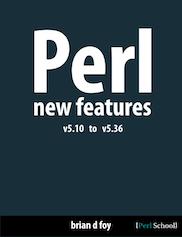 This is a chapter in Perl New Features, a book from Perl School that you can buy on LeanPub or Amazon. Your support helps me to produce more content.
This is a chapter in Perl New Features, a book from Perl School that you can buy on LeanPub or Amazon. Your support helps me to produce more content.
Perl’s coterie of brace constructs become a bit more lenient in v5.34. These things appear in double-quotish constructs, such as \N{CHARNAME} to specify a character by name. And, patterns count as a double-quoted construct (unless you use ' as the delimiter), so these new rules apply to brace constructs such as \k{} (for named backreferences) and the general quantifier, {n,m}.
Continue reading “Insignificant whitespace in brace constructs”